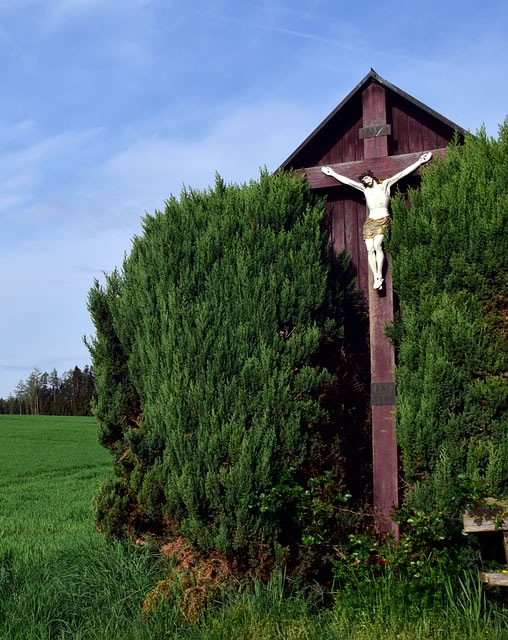

If our Holy Mother the Church seems to multiply her blessings over the farm home, and have few left for the city apartment, it is not because she is partial to her children in the country and forgetful of city children, but because she is a realist – like every woman. She knows that from the farm homes comes the world’s food supply. That is why she has composed so many sacramental blessings for the farmer. That is why she has instituted the rogation days, the three days before the Feast of the Ascension of Our Lord.
But these rogation prayers and the sacramental blessings for the farmer are not for the exclusive welfare of the country people; such blessings are for the welfare of all the members of Christ’s Body on earth – for those who live in little towns and big towns — for the rosy cheeked country urchin who has the wide open fields for a playground, and for the pale little girls whose backyard is closed in by smokestacks and ugly unpainted buildings – for the farmer plowing in his field in the bright sun, and for the subway guard who seldom sees the light of day. For all members of Our Lord’s Body are dependent on one another.
If the farmer is blessed with a good harvest, the city dweller has plenty of good food; if the city dweller makes a living wage, he can buy the farmer’s food. It is this universal dependence of the members of Christ’s Body on one another that makes the blessing of the farmer a blessing also for the dwellers in the city apartments. It is faith that traces the origin of good food beyond the corner grocery store to the wholesale dealer to the shipper–beyond the shipper to the farmers whose job it is to produce food, and beyond the farmer to God the Creator Who gives the increase to the harvest. So it is fitting for the man or woman in the city cathedral as well as the farmer in the little rural church to pray together on rogation days: “That Thou wouldst please to give and preserve the fruits of the earth…we beseech Thee hear us.”
The litany of the Saints and the psalms sung during procession on rogation days are supplications — hence the word, rogation (from the word rogare which means to ask). Psalm 103 and psalm 104 are also sung, to remind people of the curses the Bible ascribed to those who violated agricultural boundaries. During this season the faithful ask God to protect them from danger and disaster, and to bless especially the harvest so that the whole of Christ’s Body may be fed.
The rogation days are also called the days of the minor litanies, because according to the rubric of the ritual, it is customary for the pastor and his flock to go in procession through the fields of the parish changing the litany of the Saints and other prayers. There is another solemn procession through the fields on the 25th of April which is called the major litanies. This also happens to be St. Mark’s day, but there is no connection between the Evangelist’s feast and the procession.
Because most of our modern parishes are in the city and small town, and have no fields through which to march, the rogation day procession usually takes place on the parish property, or even inside the parish church itself; here at St. Meinrad’s the student-body together with the people of the parish march in solemn procession to the chapel of Our Lady of Monte Cassino a mile through the village and across the valley, chanting the litany of the Saints. There the Mass of rogation is offered by the priest in charge of the abbey farm.
The celebration of the minor and major litanies are only four days during the year when the Church solemnly asks blessings upon the harvest, but besides the rogation day blessings there are numerous sacramentals in the Roman ritual which may be used with spiritual profit by the faithful especially by the folks who live on the farm. Here are some the principal blessings which the Christian farmer may use.
Blessing of a farm
Blessing of a spring or well
Blessing of a stable
Blessing of draft animals
Blessing of domestic animals
Blessing of cattle and herds
Blessing of a granary
Blessing of young crops
Blessing of sick animals
Blessing of bees
Blessing of sheep
Blessing of new seed
Blessing of oats
Blessing of feed for animals
Blessing of fields
Blessing of swine
Blessing of goats
Blessing of orchards
Blessing of vineyards
Blessing of the stored harvest
The blessings of the Church are inexhaustible. Realizing that in our daily work we often forget that the milking of cows, the pruning of the fruit trees and the threshing of the grain is the indirect worship of God – the Church sacramentalize even the humble pig and the tiny bee. Sometimes the most beautiful poetry is contained in the simplest prayer or blessing. We have selected only a few of the farmer’s sacramentals that our readers may see for themselves the riches of that precious book, The Roman Ritual.
Blessing of a Farm
This prayer may be used to ask God’s blessing on the entire farm together with its buildings and lands, or it may be used for the farmhouse only.
“Bless, O Lord, Almighty God, this house (or, this farm); may health and purity, goodness and meekness, and every virtue reign here. May all those who dwell here be filled with faithfulness to Thy laws and with thanksgiving to God the Father, the Son, and the Holy Spirit. May this blessing remain on this house (or, this farm) and all who dwell here. Through Christ Our Lord. Amen.”
Blessing of a Stable
In this as in all other blessings the reader will notice how the Church always relates these common things to the mysteries of our Faith, like the birth of the Savior in a stable; in all her prayers the Church never forgets the dominant or main purpose of Christian life – the use of these temporal creatures in such a way as to lead the user to everlasting life in heaven.
“O Lord God Almighty, Who didst will that Thy only-begotten Son our Lord, be born in a stable, and lie in a manger between two animals, bless this stable, we pray, and guard it from the spite and deceit of the devil. Make it a safe shelter for horses, cattle, and other animals. And as the ox knows his master and the ass the manger of his lord, so grant that They servants, who are made to Thy image and closely resemble the angels, and to whom Thou hast subjected all the sheep, and the oxen and the cattle of the pastures, be not like unto senses beasts in whom there is no understanding. But let them acknowledge Thee alone as God and the Author of all good. May they faithfully persevere in Thy service, show Thee gratitude for favors received, and thus merit greater benefits in the future. Through the same Christ our Lord. Amen.”
Blessing of Draft Animals
The animals indirectly praise God by helping men to reach their final goal, and for that reason the Church blesses horses and other draft animals. In her prayer the Church calls on Saint Anthony the hermit (not the finder of lost things) who from early times was called the patron saint of farmers and animal breeders:
“O God, our refuge and our strength, give ear to the entreaties of the Church, Thou source of mercy, and grant that what we ask with faith, we may receive in fact.
Almighty, everlasting God, Who didst assist St. Anthony to emerge unscathed from the many temptations of this world, grant thy servants to progress in virtue by his illustrious example; and by his merits and intercession, free us from the ever-present dangers of life.
Let these animals receive Thy blessing, O Lord, to the benefit of their being, and by the intercession of St. Anthony, deliver them from all harm. Through Christ our Lord. Amen.”
The Blessing of Bees
In her blessing of the bees Holy Mother Church thinks not so much of the food of honey as she does of the precious wax out of which are made the candles for Mass. Reading this prayer we see with the eyes of the Church how the tiny bees also glorify God by their industry.
“O Lord, God almighty, who hast created heaven and earth! Thou didst create all living things for man’s use. Moreover, Thou didst order by the ministry of Thy Church that candles made from the industry of bees shall burn during the Sacred Mystery in which we consecrate and consume the most holy Body and Blood of Jesus Christ Thy Son. Send Thy holy blessing upon these bees and this beehive to make them numerous and productive, and to preserve them from harm, so that their yield of wax can be turned to Thy honor, and to the honor of Thy Son and Holy Spirit and to the veneration of the Blessed Virgin Mary. Through the same Christ Our Lord. Amen.”
Blessing of Seed
“We fervently entreat Thee, O Lord, to bless these seeds, preserve and foster them with gentle breezes, fertilize them with heavenly dew, and deign to bring them to a full harvest for the use of body and soul. Through Christ our Lord. Amen.”
Blessing of Young Crops
“We appeal to Thy graciousness, O Almighty God, that Thou wouldst shower Thy blessings upon these first fruits of creation, which Thou has nurtured with favorable weather, and mayest bring them to a fine harvest. Grant also to Thy people a sense of constant gratitude for Thy gifts, so that the hungry may find rich nourishment in the fruits of the earth, and the needy and the poor may praise Thy wondrous name. Through Christ our Lord. Amen.”
Blessing of a Granary
So concerned is the Church for the farmer’s welfare that even after he has his harvest of grain under roof the Church does not forget him. The harvested grain and the stored fruit need God’s blessing.
“O Lord, Almighty God, Who does not desist from pouring out upon men a superabundance of heavenly dew and the substance of the earth’s richness, we render thanksgiving to Thy most loving Majesty for all Thy gifts. We continue to beseech Thy clemency, that Thou wouldst deign to bless, preserve, and defend from every injury this harvest. Grant, likewise, that having had our desire for earthly needs filled, we may bask under Thy protection, praise Thy goodness and mercy without ceasing, and make use of temporal goods in such a way as to not to lose eternal goods.”
These are only a few of the blessings which the Church uses for the welfare of the farmer. Her ritual is filled with sacramental blessings for houses and fields, for barns and shops, for animals and tools and engines, and for almost everything that men use make their living on earth. To every country pastor and farm family we recommend the following books which contain Latin and English sacramental prayers and rites by which we beg God’s blessing on the rural home and farm.
Sources: Family Sacramentals by Walter Sullivan, O.S.B., Grail Publications, 1952 & Catholic Culture.

-
 The Complete Works of Fr. Denis Fahey – 14 TitlesUS$ 199.00
The Complete Works of Fr. Denis Fahey – 14 TitlesUS$ 199.00 -
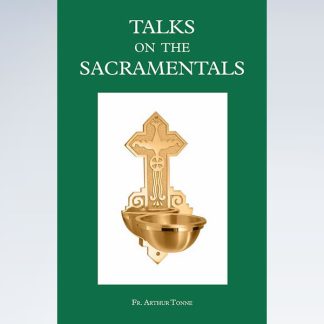 Talks on the SacramentalsUS$ 19.00
Talks on the SacramentalsUS$ 19.00 -
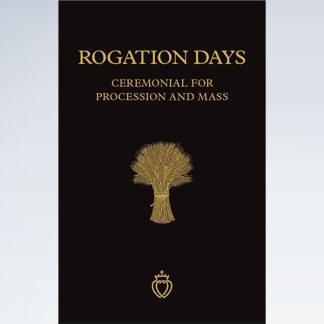 Rogation Days Ceremonial for Procession & MassUS$ 19.00
Rogation Days Ceremonial for Procession & MassUS$ 19.00 -
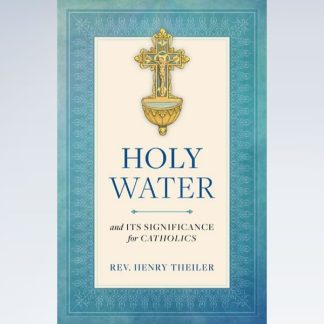 HOLY WATER and Its Significance for Catholics by Rev. Henry TheilerUS$ 15.00
HOLY WATER and Its Significance for Catholics by Rev. Henry TheilerUS$ 15.00 -
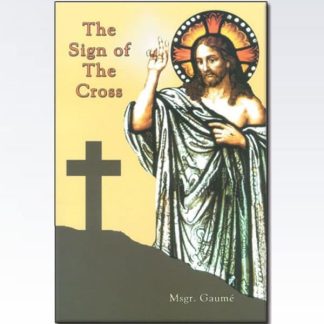 The Sign of the CrossUS$ 15.00
The Sign of the CrossUS$ 15.00 -
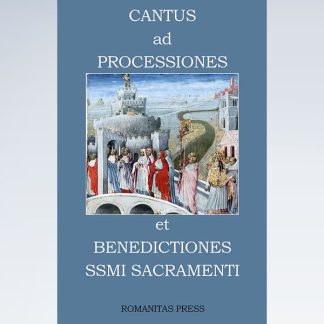 Chants for Processions and Benedictions of the Most Blessed SacramentUS$ 16.00
Chants for Processions and Benedictions of the Most Blessed SacramentUS$ 16.00
VIRGÓ SACRÁTA is a Christian mission-driven online resource and shop inspired from the beauty of Catholic faith, tradition, and arts. Our mission is to “Restore All Things to Christ!”, in continuing the legacy of Pope St. Pius X under the patronage of the Blessed Virgin Mary. “Who is she that cometh forth as the morning rising, fair as the moon, bright as the sun, terrible as an army set in battle array?” O Mary, conceived without sin, pray for us who have recourse to Thee.


